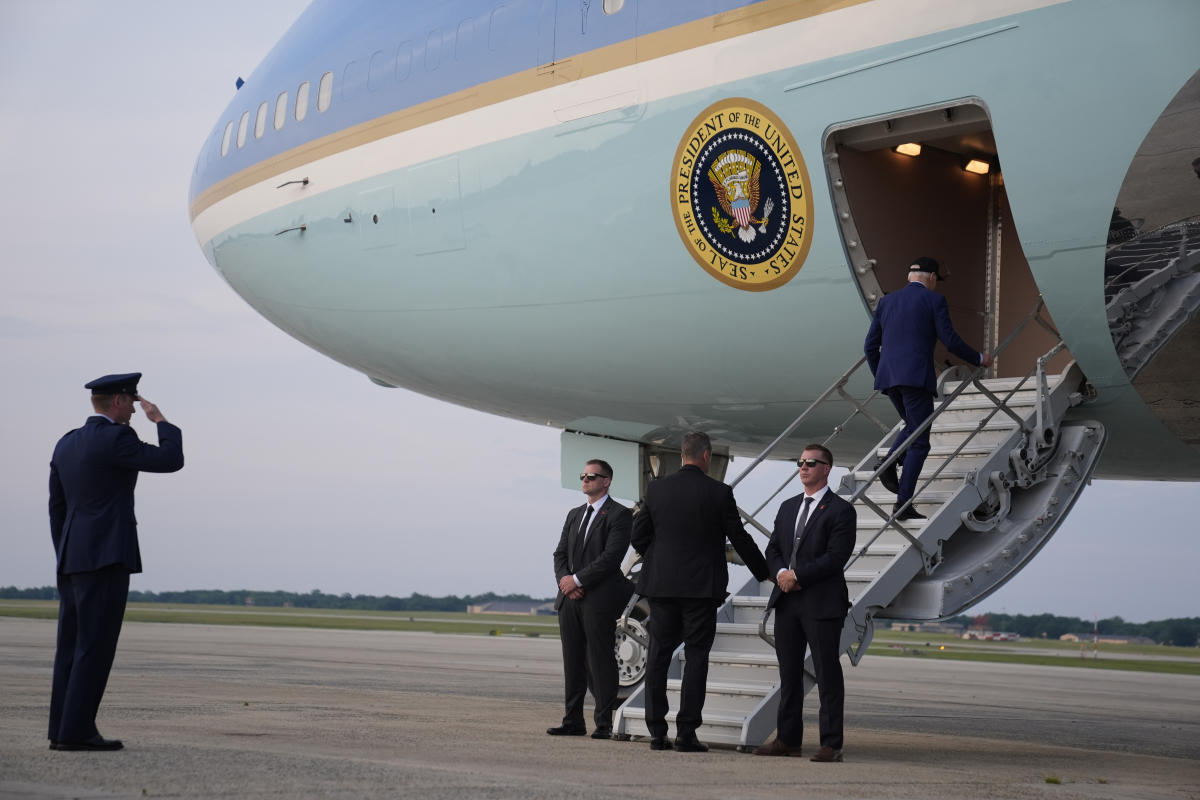President Joe Biden During his 2020 campaign, he promised to restore America’s alliances and leadership abroad.
But if Biden’s foreign policy that year provided an effective contrast to Donald Trump’s “America First” isolationism, it has now become a liability for his 2024 campaign.
As Biden begins a month of high-stakes international meetings with a trip to France this week, two bloody wars in Ukraine and Gaza have complicated the president’s job and, polls show, contributed to the shaky political position at home.
“There’s a sense of global chaos that won’t help him this fall,” said Matt Duss, a former senior policy adviser to Sen. Bernie Sanders (I-Vt.) and executive vice president at the Center for International Policy. . “I think people have legitimate questions: ‘Are we on the right track here?'”
Or as one longtime Democratic strategist, granted anonymity to discuss the matter candidly, put it: “Foreign policy is a problem for Biden because it undermines the central premise of his 2020 candidacy, when he said he would fix America abroad and send us back to normality.”
Biden’s polls took a hit — and never recovered — after the failed withdrawal of U.S. troops from Afghanistan in the summer of 2021, in which 13 U.S. service members were killed by a suicide bomber. But after that debacle, Biden could still point to a string of foreign policy successes. Midway through his term, he had helped unite NATO allies after Russia’s invasion of Ukraine in February 2022 and thwarted President Vladimir Putin’s hopes for a quick and easy war.
That has reversed in recent months, as Ukraine has lost ground in a slow, brutal war of attrition that critics say is partly due to Washington’s six-month delay in approving the latest round of defense aid. And a second war in Gaza, which began with the Hamas terrorist attack on October 7, 2023, appears nowhere near a resolution, despite Biden’s efforts to broker a ceasefire.
Those conflicts are sure to dominate discussions during Biden’s five-day trip to France, which starts Wednesday, as well as the G7 summit in Italy next week and the historic NATO summit marking the alliance’s 75th anniversary, which starts early next month takes place in Washington. Both wars have left Biden in political trouble, and the alliance faces critical questions about its next secretary general, cost-sharing and its overall stance toward Russia.
American public support for continued financing of Ukraine’s defense has waned, which partly explains why it took six months for Republicans in the House of Representatives to authorize a vote on another $60 billion in aid, which ultimately expired at the end April was passed – after Russian troops took back territory from a depleted area. Ukrainian army. And Israel’s ongoing war in Gaza has been politically more damaging for Biden, who has continued to defend Israel’s response to the October 7 Hamas terrorist attack even as Prime Minister Benjamin Netanyahu has not yet heeded his calls for a ceasefire firing and warnings to limit civilian deaths. .
A New York Times/Siena College poll last month found that half of registered voters in six battleground states said they trusted Trump more than Biden in handling the Israeli-Palestinian conflict. Only 35 percent said they trusted Biden more.
“If this election is at all about foreign policy, Biden is going to lose,” said Ian Beerder, the president of the Eurasia Group, a risk assessment firm in New York. “His China policy is basically the same as Trump’s and there are now two wars, neither of which are going well.”
The president’s upcoming contacts with world leaders will provide an opportunity to highlight the hallmarks of his approach to foreign policy: stable crisis management and strong relationships with allies, according to his aides. This week, Biden will plant his political flag on hallowed ground with back-to-back speeches in Normandy, a place almost as defining of the nation’s story as Gettysburg. By using the D-Day anniversary to remind the public of his own commitment to defending democracy at home and abroad, the president will be able to draw a sharp contrast with Trump, aides say.
Biden emphasized that contrast in a wide-ranging interview with Time magazine that was published on Tuesday and focused on foreign policy. In what was only his third with a print journalist since taking office, he praised his work to revive and expand NATO after Russia’s invasion of Ukraine and outlined his core belief in “values-based” alliances as fundamental for American and global security. “We are the strongest country now,” he said. “We have the strongest alliance in all of America, in all of history.”
Biden senior campaign spokesman Kevin Munoz said in a statement that Biden “continues to demonstrate that he is the only candidate running in 2024 who has the experience and temperament to be commander in chief,” contrasting the president with Trump, who he said, “continues to remind the American people how dangerous and unfit for office he is.”
The trips to France and Italy also come days after Biden outlined the terms of a possible deal between Israel and Hamas that could ultimately lead to a ceasefire after eight months of war — an opening that could change his position at home if that happens. But Netanyahu, who disagreed with the president, suggested Monday that Biden’s description of the deal was “incomplete.” Despite the political damage the president suffered from that war, crafting a solution to months of fighting could also demonstrate the benefits of having an experienced hand in the Oval Office, according to aides.
National Security Council spokesperson Adrienne Watson said Biden had “rallied the world to respond to Russia’s invasion of Ukraine,” arguing that “presidents cannot control world events, but they can control how we respond to them.”
Celinda Lake, a Democratic pollster working with the Biden campaign, said foreign policy clarifies qualities like “character” and “leadership” for voters, a “very vivid” contrast that “works for [Biden]against Trump, despite the ongoing wars.
“[Voters] don’t blame [Biden] for these wars, and many older women in particular are very happy that Joe Biden is in charge and not Donald Trump,” Lake said. “People think that Donald Trump is an ally of Putin [against Ukraine]that he has not the temperament or the judgment.
Reminding voters of Trump’s foreign policy rhetoric is a key task for the campaign because “there is concern about memory loss,” said Marie Harf, a top foreign policy spokesperson for Barack Obama’s administration. The main targets are independent and Republican voters, including those who supported former U.N. Ambassador Nikki Haley during the 2024 Republican primaries and who do not approve of Trump’s flirtation with foreign autocrats.
“When voters are reminded of how reckless and chaotic Trump was on the world stage, how he reconciled with Putin and rejected our allies, voters will move,” Harf said. “We have to remind them, and that’s the job of campaigns.”
But Lake said Biden still faces a “vulnerability” on foreign policy, with working-class voters in particular “worried about how much money we’re spending abroad.” Last year, Lake was holding focus groups with black voters in Detroit, when one woman complained that Volodymyr Zelenskyy, the Ukrainian president, could get billions of dollars in aid from Washington, while “we are in Detroit and we get nothing.”
The domestic response to the war in Gaza is even more complicated for Biden, whose support among young voters — whose polls show a presidential handling of the conflict — has been deteriorating in recent months. Economic issues still rank much higher for young voters. But “what should worry the Biden campaign,” Duss said, is that for the young people who care deeply about Gaza, “they won’t have spent the last few weeks and months getting out the vote.”
“It’s going to put a damper on the volunteerism, the phone banking and the door knocking, and that’s what could really hurt them on the margins, and these are elections that are going to be won or lost on the margins,” Duss added.
Since the war in Iraq, foreign policy has not played a leading role in voters’ decision-making. And even as recent incumbents like Obama did not score highly among voters on foreign policy approaches, domestic issues were more important to voters. Democrats still broadly expect the same to hold true in 2024, especially since, unlike in 2004, there are no U.S. troops in major combat zones. That includes Democratic pollster Paul Maslin, who said he believes it will be a “90 percent domestic election,” although “I wouldn’t rule out that foreign policy could still have some impact on voters who decide too late.”
But the escalation of foreign conflicts beyond Biden’s control, on top of the failed exit from Afghanistan, has given Trump and Republicans fodder for rallying the Republican base, with Trump posting on social media on Tuesday that “Weak Joe Biden is only now getting on his way is to repair the DISASTER he caused in the Middle East.” And it has raised concerns among Democrats about the breakdown of their coalition, with recent polls showing a majority of voters still disapprove of the president’s handling of foreign affairs.
“A protester came up to me [recently] and explain very calmly [that] in his mind that if Biden doesn’t change course, he will lose the election,” said Rep. Seth Moulton (D-Mass.), a combat veteran who served in Iraq. “We would like to think that those people will eventually come to Biden, but they are so angry right now. It’s hard to estimate.”







